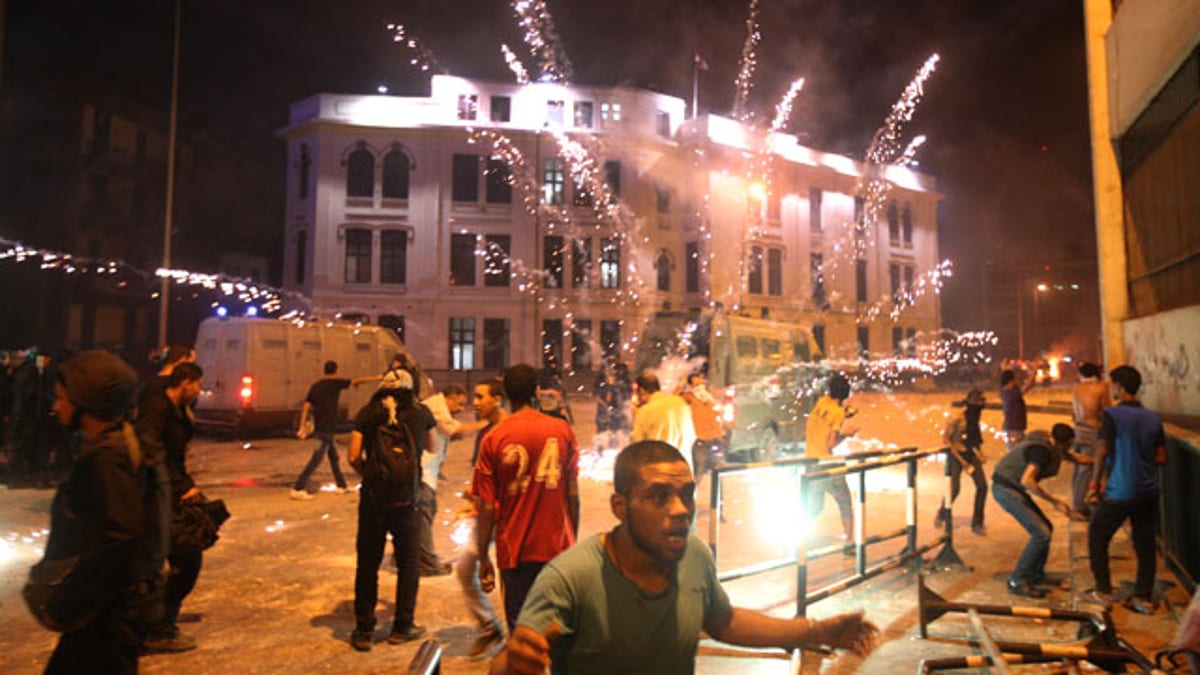
Ju;y 15, 2013: Opponents of ousted President Mohammed Morsi run from fireworks fired by pro-Morsi supporters during clashes on a bridge in downtown Cairo. Thousands of supporters of deposed President Mohammed Morsi held mass rallies and marched in the streets Monday to demand his return to office. The protest turned violent in downtown Cairo as police fired tear gas at pro-Morsi protesters who burned tires, threw rocks and blocked traffic flow on a main roadway running through the heart of the capital. (AP Photo/Hussein Malla)
Egypt's interim president swore in the country's first government after the ouster of former leader Mohammed Morsi, following overnight clashes between police and Morsi supporters that left at least seven people dead.
The new government is led by Prime Minister Hazem el-Beblawi, an economist, and features the promotion of Defense Minister Gen. Abdel-Fattah el-Sissi, who ousted Morsi on July 3, to deputy prime minister. He also retains the defense portfolio
The Morsi-appointed interior minister, Mohammed Ibrahim, remains in his post, in charge of the police. Nabil Fahmy, who was Egypt's ambassador to the U.S. from 1999-2008, becomes foreign minister.
Underlining the relatively liberal outlook of the new government, President Adly Mansour named three women in his Cabinet, taking the powerful ministries of information and health as well as the environment ministry. The Cabinet has 33 members, not including el-Beblawi.
Most past governments for decades have had at most two women in them.
The Cabinet does not include any figures from Islamist parties. The interim president's spokesman had said posts would be offered to Morsi's Muslim Brotherhood.
The proceedings were shown live on state TV and were quickly denounced by the Brotherhood.
"It's an illegitimate government, an illegitimate prime minister, an illegitimate cabinet. We don't recognize anyone in it. We don't even recognize their authority as representatives of the government," spokesman Gehad El-Haddad told Reuters.
Khaled el-Khateeb, the head of the Health Ministry's emergency and intensive care department, said 261 people were injured in the clashes that broke out late Monday and carried on into the early morning hours of Tuesday in four different locations in Cairo.
Egypt's state news agency said 17 policemen were injured in the violence, and 401 people have been arrested.
There was no official word on how the seven people died, but security officials said four of them were killed in clashes between Morsi supporters staging a sit-in near the main Cairo University campus and residents of the area. The officials spoke on condition of anonymity because they were not authorized to speak to the media.
Thousands of supporters of Morsi were protesting to demand that he be reinstated.
The army stepped in to remove Morsi after days of mass protests calling for the Islamist leader's removal on the grounds that he had failed to solve any of the country's pressing problems. His opponents also accused him of concentrating too much power in his own hands.
The ousted president's supporters say he was removed by a military coup that overturned democratic rule. Thousands of them have been staging sit-ins in two different locations in Cairo, one outside Cairo University and another outside a mosque in a neighborhood in eastern Cairo that is a Brotherhood stronghold.
The violence, which was focused in the center of the city, saw protesters pelt the police with rocks and firebombs. The police fired volleys of tear gas in response. The Muslim Brotherhood, the Islamist group from which Morsi hails, said police used birdshot and live ammunition.
The clashes stopped a run of peaceful protests by Morsi supporters this week and came hours after a senior American diplomat said that Egypt had "a second change to realize the promise of the revolution" that ended the presidency of Hosni Mubarak in 2011.
U.S. Deputy Secretary of State William Burns met with the military-backed administration led by interim President Adly Manour and Prime Minister-designate Hazem el-Beblawi, as well as army chief and Defense Minister Gen. Abdel-Fattah el-Sissi.
At a news conference, Burns attempted to emphasize that the U.S. government is not taking sides in the conflict, saying, "It is not our business, as Americans, as outsiders, to support particular political personalities or particular parties. That's the business of Egyptians. What we will continue to try to do is to support and open, inclusive, tolerant, democratic process which is going to be the only way to build broad popular confidence in the sorts of institutions that are the aim of the revolution,” Burns told reporters at a news conference.
Burns also said the U.S. is asking the Egyptian military to avoid politically motivated arrests.
However, the Egyptian army said Monday it would respond with the "utmost severity and firmness and force'' if demonstrators tried to approach or break into its bases, according to a Reuters report.
In the wake of the coup, the new military-backed administration has moved swiftly against the Brotherhood, detaining several senior leaders over accusations that included inciting violence and killing protesters. Authorities have issued arrest warrants for the group's leader, Mohammed Badie, and at least 13 other prominent Islamists.
The Associated Press contributed to this report.
